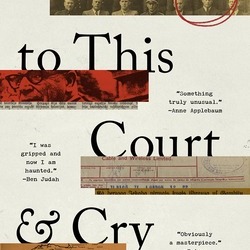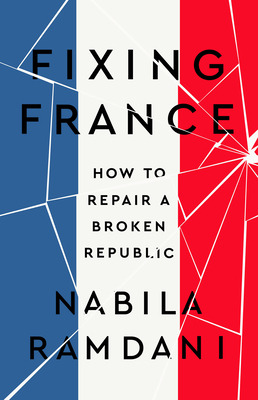#PublicAffairs
Note
Any books you'd particularly recommend outside of US/Presidential history?
I always will take opportunities like this question to recommend Charles Emmerson's 2019 book, Crucible: The Long End of the Great War and the Birth of a New World, 1917-1924 (BOOK | KINDLE). I know it'll sound like hyperbole, but I am not exaggerating: it's one of the best books I've ever read, if not the best. It has stayed with me ever since I finished it, largely because of how absolutely riveting Emmerson's writing style is. I don't know if I've ever read a single book that has told so many incredible stories about so many remarkable people and so many fascinating places. And it does so without ever losing its overall focus or confusing the reader. I love this book and every time I see it on one of my bookshelves I get jealous that I can't read it for the first time over-and-over again.
Another book that immediately comes to mind is Lawrence Wright's Going Clear: Scientology, Hollywood, and the Prison of Belief (BOOK | KINDLE), which I'm sure many others would back me up on. I'm a huge fan of all of Lawrence Wright's work, so you can't go wrong with any of his other books, particularly The Looming Tower: Al-Qaeda and the Road to 9/11 (BOOK | KINDLE) and The Terror Years: From Al-Qaeda to the Islamic State (BOOK | KINDLE), both of which are journalism at its very best. And I understand you asked about books that didn't have anything to do with the Presidency, but it would be criminal if I didn't also suggest Wright's excellent history of the 1978 Camp David Accords between Israel and Egypt, Thirteen Days in September: Carter, Begin, and Sadat at Camp David (BOOK | KINDLE). The difficult peace negotiations between President Carter, Israeli Prime Minister Menachem Begin, and Egyptian President Anwar Sadat are detailed so intimately that Wright originally began writing it as a play, and the storytelling remains just as vivid as if it were being performed on a stage.
By no means is that a complete list of suggestions, but those are the first books that came to mind when reading your question. But, seriously, don't hesitate to read Charles Emmerson's Crucible ASAP!!!
#Books#History#History Books#Reading#Book Suggestions#Book Recommendations#Crucible#Charles Emmerson#Crucible: The Long End of the Great War and the Birth of a New World#PublicAffairs#Lawrence Wright#The Looming Tower#Going Clear#The Terror Years#Thirteen Days in September#The Looming Tower: Al-Qaeda and the Road to 9/11#The Terror Years: From Al-Qaeda to the Islamic State#Camp David Accords#Scientology#President Carter#Menachem Begin#Anwar Sadat#Al-Qaeda#Larry Wright#Knopf#Alfred A. Knopf
28 notes
·
View notes
Text
youtube
#youtube#news#DepartmentOfState#PressBriefing#April3#2024#ForeignAffairs#InternationalRelations#Government#USA#News#CurrentEvents#Politics#StateDepartment#Briefing#Diplomacy#GlobalAffairs#WorldNews#PublicAffairs#MediaRelations#Information#Update
0 notes
Text
For no part of life, neither public affairs nor private, neither in the forum nor at home, neither when acting on our own nor in dealings with another, can be free from duty. Everything that is honorable in a life depends upon its cultivation, and everything dishonorable upon its neglect.
Cicero
0 notes
Text
An Overview of Government Contracting for Companies
Gov Business Review :

Contracts serve as the business operations framework, defining the parameters and obligations governing the relationship between parties. For both small enterprises and large corporations, understanding the nuances of contracting is essential for mitigating risks, ensuring compliance, and fostering successful collaborations. Clear, unambiguous language is paramount in contracts. Whether it's a small partnership agreement or a multimillion-dollar corporate deal, parties must have a mutual understanding of their rights, responsibilities, and the consequences of non-compliance. Ambiguities can lead to costly disputes, potentially harming business relationships.
The scope of work delineates the specific tasks, deliverables, and timelines associated with a contract. Both small and large companies must be aware of industry-specific regulations, as well as broader legal frameworks. Ignorance of compliance requirements can lead to severe penalties and reputational damage. Identifying and mitigating risks is a cornerstone of effective contract management. Small companies with limited resources must be especially vigilant, as unforeseen liabilities can be disproportionately damaging. Large corporations often have risk management departments, but they must remain vigilant in evaluating the potential consequences of each contract.
0 notes
Text
Best Public Affairs Consulting Firm & Agency in Delhi | Seraphim Communications
Discover the pinnacle of public affairs consulting in Delhi with Seraphim Communications – your trusted ally. As the best consulting firm and agency, we navigate the complexities of public affairs, offering strategic solutions. Elevate your influence, build connections, and shape narratives with Seraphim. Unleash the power of effective communication.
#publicaffairsconsultingfirms#publicaffairs#publicaffairsmastery#publicaffairsconsulting#publicaffairsagency#publicaffairsconsultingfirm#publicrelationsconsulting
0 notes
Photo

STUPIDITY QUOTE 3 OF 3
Saturday, December 24, 2022
"Bureaucracies, I've suggested, are not themselves forms of stupidity so much as they are ways of organizing stupidity--of managing relationships that are already characterized by extremely unequal structures of imagination, which exist because of the existence of structural violence."
- David Graeber, The Utopia of Rules: On Technology, Stupidity, and the Secret Joys of Bureaucracy
~~~~~~~~~~~~~~~~~~~~~~~~~~~~~~~~~~~~~~~~~~~~~~~~
Interested in the book?
Snag it real quick by clicking here!
Image made with the Quotes Creator App.
See the original post on Instagram!
Watch MonriaTitans on Twitch and YouTube!
#davidgraeber#theutopiaofrules#stupidity#educational#administration#bureaucracy#organizing#organizingstupidity#popularculture#publicaffairs#secretjoys#structuralviolence#technology#theory#unequalstructures#davidgraeberquote#davidgraeberquotes#stupidityquote#stupidityquotes#quotesaboutstupidity#educationalpost#educationalposts#learnsomethingneweveryday#becomesmartereveryday#monriatitans#mt#quotescreatorapp#affiliatelink#bookshoporg
0 notes
Text
Come to This Court and Cry by Linda Kinstler
Come to This Court and Cry by Linda Kinstler
How the Holocaust Ends
In 1965, five years after the capture of Adolf Eichmann in Buenos Aires, one of his Mossad abductors was sent back to South America to kill another fugitive Nazi, the so-called “butcher of Riga,” Latvian Herberts Cukurs. Cukurs was shot. On his corpse, the assassins left pages from the closing speech of the chief British prosecutor at the International Military Tribunal at…

View On WordPress
0 notes
Text
Anthony Starke

Join My Black City in Celebrating and Supporting Anthony Starke. We Shine Brighter Together. #MyBlackCity
https://myblackcity.org/anthony-starke/?feed_id=10190
>> Assistant Professor of Public Affairs at University of Colorado | Denver
>> Dr. Starke worked as a human services practitioner engaging with public and private service providers. His work broadly orbits around issues of democracy, identity, citizenship, and social equity. His research includes specific interests in vulnerable and traditionally marginalized populations, public service education, and liberation.
0 notes
Text
FIXING FRANCE: How to Repair a Broken Republic, less how-to than why-should

More a why-should than a how-to. Author Ramdani goes through the laundry list of increasing right-wing populist horrors that the country's indulging its worst self by celebrating. She shares her very low opinion of the pantouflard Macron. She cites her own experiences and journalism, she sources a lot, but not all, her asseverations about the French Fifth Republic in her "Notes" section. A lot of "everybody knows"ism is present; the right-wing's angry voices are referred to as "{like} Presidents, they are almost always white males" and then in the next sentence, she says "{s}tated facts are scant"! Accusing your enemy of your own sin. Marine Le Pen's public schism from her Nazi-collabortating anti-semite father is treated as political theater without linking to or performing substantive analyses demonatrating it as such, for another example. This is probably true but you're writing a book advocating the disestablishment of the Fifth Republic in it sixty-fifth year, when it's one of the cornerstones of the EU and multiple supranational alliances. You need to go the extra mile with such a proposition.
I'm aware of flaws and inconsistencies in a book, in general, I agree with. I'm aware also of the genuine value proposition the book represents. Most US readers are not aware of how very new France's current government is; they have the same illusion of ancient permanence about their own. No structure of government is, or should be, permanent; that illusion is perpetuated by those who despise and fear We-The-People, because the idea of changing governments is threatening to their control of society's attention.
So, in my opinion, read this book to follow the author's poiting finger, and attend to her argument's substance, not sources. These could be more complete. The argument for a better, more just, more inclusive France, however, is in and of itself convincing and deserves close and attentive reading here in the US.
0 notes
Photo

@delhi_royale 👑 It’s The Weekend 🥂 . For More Info Checkout Delhi Royale luxury lifestyle blog . https://www.delhiroyale.in/luxury-lifestyle-blog . #delhi_royale 👑 #cheers #champagne #publicaffair #luxurylifestyle #luxurylife #mensfashion #delhi #delhincr #delhites #delhigram #delhiluxury #weekendvibes #champagnepapi #delhi_igers #delhifoodguide #hatlover #delhifashionblogger #fashion #luxurydrinks #mensblog #moetchandon #mensstyle #india #delhiblogger #delhifoodie #moet #mralag #delhiluxuryblogger #champagneproblems (at Public Affairs) https://www.instagram.com/p/Ci5WLrPJZe5/?igshid=NGJjMDIxMWI=
#delhi_royale#cheers#champagne#publicaffair#luxurylifestyle#luxurylife#mensfashion#delhi#delhincr#delhites#delhigram#delhiluxury#weekendvibes#champagnepapi#delhi_igers#delhifoodguide#hatlover#delhifashionblogger#fashion#luxurydrinks#mensblog#moetchandon#mensstyle#india#delhiblogger#delhifoodie#moet#mralag#delhiluxuryblogger#champagneproblems
0 notes
Text
Throughout Lafayette’s life, determination, far more than cunning, guile, or raw intelligence, was his greatest strength. But as he struck out toward a new world, on a new adventure, as a new man, he was guided by a new motto: Why Not?
Mike Duncan, Hero of Two Worlds: The Marquis de Lafayette in the Age of Revolution, PublicAffairs, New York, 2021.
#marquis de lafayette#la fayette#french history#american history#history#american revolution#french revolution#quote#mike duncan#hero of two worlds
33 notes
·
View notes
Text
Imagine that all the world’s knowledge is stored, and organized, in a single vertical Steelcase filing cabinet. Maybe it’s lima-bean green. It’s got four drawers. Each drawer has one of those little paper-card labels, snug in a metal frame, just above the drawer pull. The drawers are labelled, from top to bottom, “Mysteries,” “Facts,” “Numbers,” and “Data.” Mysteries are things only God knows, like what happens when you’re dead. That’s why they’re in the top drawer, closest to Heaven. A long time ago, this drawer used to be crammed full of folders with names like “Why Stars Exist” and “When Life Begins,” but a few centuries ago, during the scientific revolution, a lot of those folders were moved into the next drawer down, “Facts,” which contains files about things humans can prove by way of observation, detection, and experiment. “Numbers,” second from the bottom, holds censuses, polls, tallies, national averages—the measurement of anything that can be counted, ever since the rise of statistics, around the end of the eighteenth century. Near the floor, the drawer marked “Data” holds knowledge that humans can’t know directly but must be extracted by a computer, or even by an artificial intelligence. It used to be empty, but it started filling up about a century ago, and now it’s so jammed full it’s hard to open.
From the outside, these four drawers look alike, but, inside, they follow different logics. The point of collecting mysteries is salvation; you learn about them by way of revelation; they’re associated with mystification and theocracy; and the discipline people use to study them is theology. The point of collecting facts is to find the truth; you learn about them by way of discernment; they’re associated with secularization and liberalism; and the disciplines you use to study them are law, the humanities, and the natural sciences. The point of collecting numbers in the form of statistics—etymologically, numbers gathered by the state—is the power of public governance; you learn about them by measurement; historically, they’re associated with the rise of the administrative state; and the disciplines you use to study them are the social sciences. The point of feeding data into computers is prediction, which is accomplished by way of pattern detection. The age of data is associated with late capitalism, authoritarianism, techno-utopianism, and a discipline known as data science, which has lately been the top of the top hat, the spit shine on the buckled shoe, the whir of the whizziest Tesla.
[...]
It’s easy to think of the ills produced by the hubristic enthusiasm for numbers a century ago, from the I.Q. to the G.D.P. It’s easy, too, to think of the ills produced by the hubristic enthusiasm for data today, and for artificial intelligence (including in a part of the Bay Area now known as Cerebral Valley). The worst of those ills most often have to do with making predictions about human behavior and apportioning resources accordingly: using algorithms to set bail or sentences for people accused or convicted of crimes, for instance. Connelly proposes that the computational examination of declassified documents could serve as “the functional equivalent of CT scans and magnetic resonance imaging to examine the body politic.” He argues that “history as a data science has to prove itself in the most rigorous way possible: by making predictions about what newly available sources will reveal.” But history is not a predictive science, and if it were it wouldn’t be history. Legal scholars are making this same move. In “The Equality Machine: Harnessing Digital Technology for a Brighter, More Inclusive Future” (PublicAffairs), Orly Lobel, a University of San Diego law professor, argues that the solution to biases in algorithms is to write better algorithms. Fair enough, except that the result is still rule by algorithms. What if we stopped clinging to the raft of data, returned to the ocean of mystery, and went fishing for facts?
-- "the data delusion," jill lepore, new yorker 3/27/23
26 notes
·
View notes
Text
youtube
#youtube#news#DepartmentOfState#PressBriefing#April1#2024#StateDepartment#ForeignPolicy#CurrentEvents#USPolitics#InternationalRelations#GovernmentNews#Diplomacy#GlobalAffairs#NewsUpdate#MediaBriefing#PoliticalNews#USGovernment#PublicAffairs#InformationalBriefing#GovernmentPressConference#StateDeptBriefing
0 notes
Text
Jul - Dec 2023 Reading List:
Bernard, Jessie. The Future of Marriage. New Haven: Yale University Press, 1982.
Budapest, Zsuzsanna Emese. The Holy Book of Women’s Mysteries. San Francisco: Weiser, 2007.
Cady Stanton, Elizabeth, “The Destructive Male.” 1868. http://edchange.org/multicultural/speeches/stanton_destructive_male.html
Chollet, Mona. In Defense of Witches: The Legacy of the Witch Hunts and Why Women are Still on Trial. New York: St. Martin’s Press, 2022.
Christ, Carol P. Rebirth of the Goddess: Finding Meaning in Feminist Spirituality. Reading, MA: Addison-Wesley, 1997.
Cloninger, Sally J. “A Rhetorical Analysis of Feminist Agitation.” The University of Michigan Papers in Women’s Studies 1, no. 1 (February 1974): 44-50. https://quod.lib.umich.edu/m/mfs/acp0359.0001.001/46:4
Daly, Mary. Beyond God the Father: Toward a Philosophy of Women’s Liberation. Boston: Beacon Press, 1973.
Dworkin, Andrea. Right-Wing Women. New York: G. P. Putnam’s Sons, 1983.
Echols, Alice. Daring to Be Bad: Radical Feminism in America: 1967-75. Minneapolis: University of Minnesota Press, 1989.
Eisler, Riane. The Chalice and the Blade: Our History, Our Future. New York: HarperCollins, 1987.
Faludi, Susan. Backlash: the Undeclared War Against American Women. New York : Crown Publishers, Inc., 1991.
Frymer-Kensky, Tikva. In the Wake of the Goddesses: Women, Culture, and the Biblical Transformation of Pagan Myth. New York: The Free Press, 1992.
Griffin, Susan. Pornography and Silence: Culture’s Revenge Against Nature. New York: Harper & Row, 1981.
Harding, M. Esther. Woman’s Mysteries: Ancient and Modern. Boston: Shambhala, 1990.
Janega, Eleanor. The Once and Future Sex: Going Medieval on Women’s Roles in Society. New York: W. W. Norton & Company, 2023.
Johnson, Sonia. From Housewife to Heretic. Garden City, N.Y: Doubleday, 1981.
Jones, Ann. Women Who Kill. New York: Holt, Rinehart, and Winston, 1980.
Jones, Beverly and Judith Brown. “Toward a Female Liberation Movement.” Jul 1968. https://www.redstockings.org/index.php/main/classics-of-1968
Judd, Elizabeth. “Women Before the Conquest: A Study of Women in Anglo-Saxon England.” The University of Michigan Papers in Women’s Studies 1, no. 1 (February 1974): 127–49. https://quod.lib.umich.edu/m/mfs/acp0359.0001.001/129:8
Koedt, Anne. “The Myth of the Vaginal Orgasm.” 1970. https://www.cwluherstory.org/classic-feminist-writings-articles/myth-of-the-vaginal-orgasm#
New York Radical Women, Notes From the First Year (June 1968). https://www.redstockings.org/index.php/main/classics-of-1968
Raworth, Kate. Doughnut Economics: Seven Ways to Think Like a 21st Century Economist. White River Junction: Chelsea Green Publishing, 2017.
Reed, Evelyn. “The Myth of Women’s Inferiority.” The Myth of Women’s Inferiority by Evelyn Reed 1954. Accessed July 9, 2023. https://www.marxists.org/archive/reed-evelyn/1954/myth-inferiority.htm.
Spender, Dale. There’s Always Been a Women’s Movement This Century. London: Pandora Press, 1983.
Starhawk. The Spiral Dance: A Rebirth of the Ancient Religion of the Great Goddess. San Francisco: HarperSanFrancisco, 1999.
Women’s Majority Union, Lilith (Dec 1968). https://www.redstockings.org/index.php/main/classics-of-1968
Zeisler, Andi. We Were Feminists Once: From Riot Grrrl to CoverGirl®, the Buying and Selling of a Political Movement. New York: BBS PublicAffairs, 2016.
8 notes
·
View notes
Text
Book of the Day - The Crux: How Leaders Become Strategists
Today’s book of the day is The Crux: How Leaders Become Strategists, written by Richard P. Rumelt in 2022 and published by PublicAffairs.
Richard P. Rumelt is an internationally known writer, speaker, and consultant on strategy. He is also Emeritus Professor at UCLA Anderson. He received his MSEE from UC Berkeley and his doctorate in business from Harvard Business School.
The Crux, by Richard…

View On WordPress
#best book#Book#Book Of The Day#book recommendation#book review#book suggestions#bookstagram#booktok#Business#Business strategy#Growth#problem solving#Raffaello Palandri#Richard Rumelt#Strategy#The Crux
15 notes
·
View notes
Text
Best Public Relations Agency in India | Seraphim Communications

Seraphim Communications is the leading public relations agency in India, dedicated to providing exceptional PR services. With a team of experienced professionals, we deliver strategic communication solutions tailored to your brand's needs. Trust us to elevate your brand's reputation and visibility. Contact us today for effective PR campaigns that will make your business soar.
#PublicAffairsAgency#PublicRelations#PRAgency#PublicAffairs#ConsultingFirms#PublicAffairsConsulting#PublicRelationsConsulting
0 notes